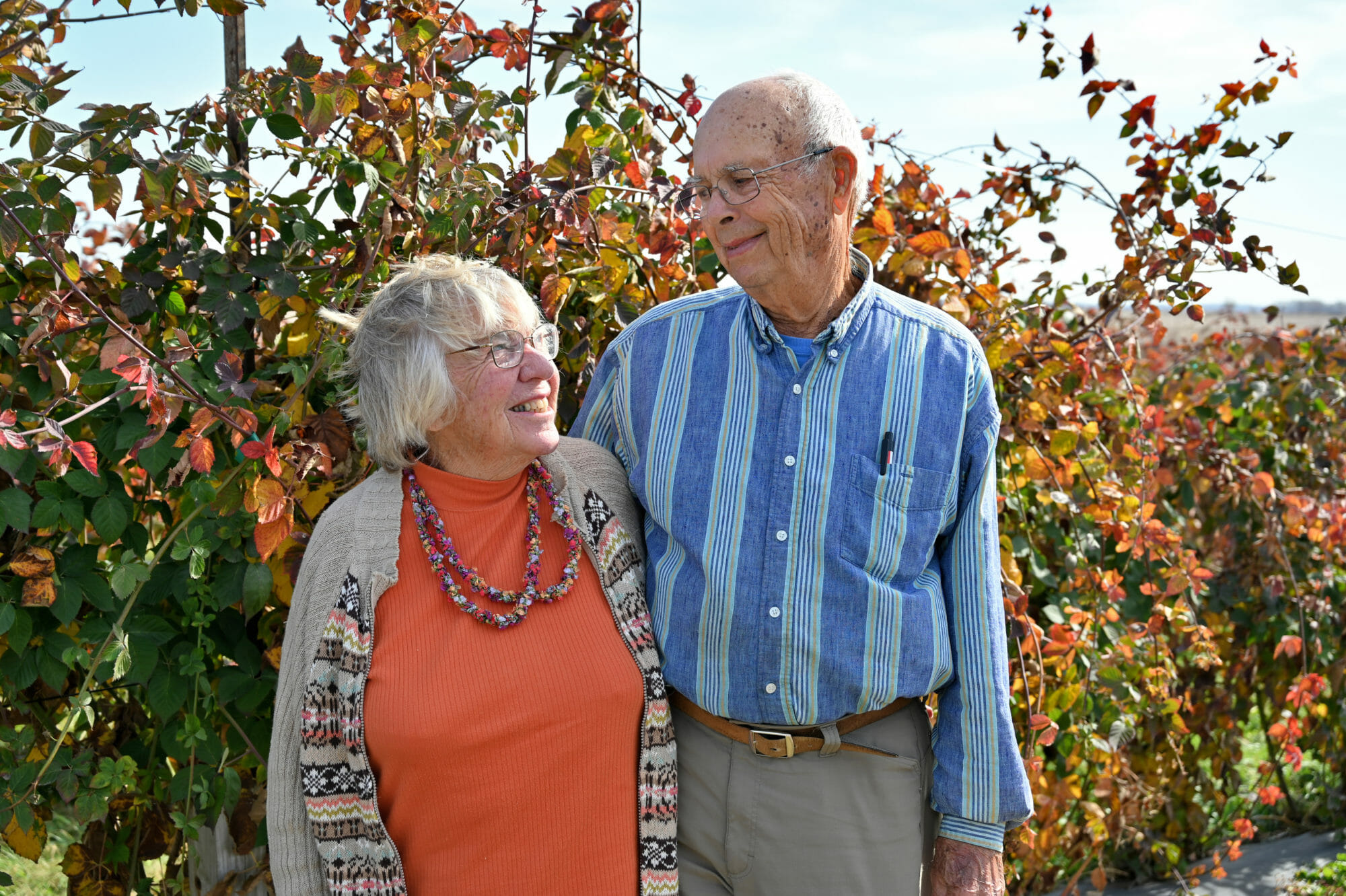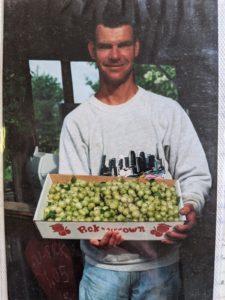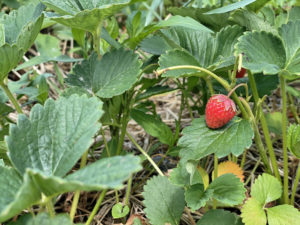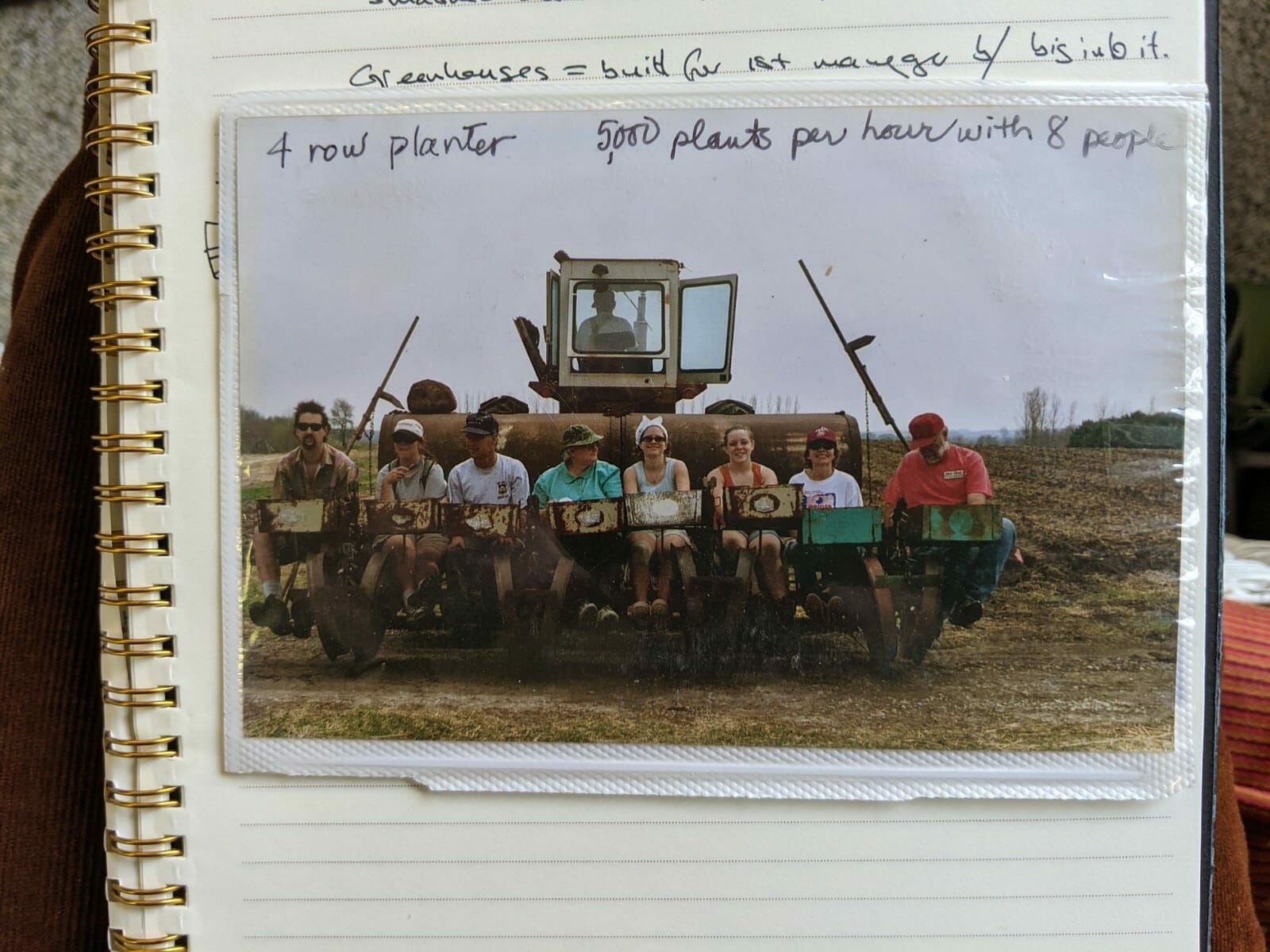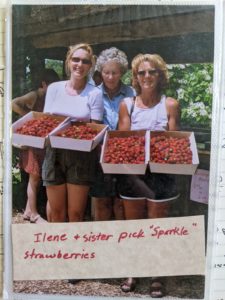Fresh Off the Farm
When Dean and Judy Henry, owners of the iconic Berry Patch Farm, planted their first strawberries over 50 years ago, they were students at Iowa State University with no land, experience or mentors to help guide them.
“Our little front yard at Pammel Court was the size of a postage stamp,” says Judy with a laugh, recalling the ISU student housing where she and Dean nurtured those first plants.
“They didn’t do very well,” Dean adds with a chuckle.
Today, the Henrys are widely recognized experts in berry and orchard fruit production whose 140-acre pick-your-own farm south of Nevada, Iowa, has been a staple for generations of Iowans, synonymous with high-quality, flavorful fruits and a commitment to community. For five decades, the Henrys have raised a variety of horticultural crops, both familiar and less common. During that time, they have pioneered fruit production and marketing approaches in Iowa; championed community-focused agriculture and local foods; experimented with a range of vegetable and fruit crops, both outdoors and in greenhouses; and worked to steward their land while serving as mentors to the next generation.
“Our strategy was to have something diversified through the whole season.”
-Dean Henry
Farming with their son, Mike, who has been an integral part of the farm’s operations for many years, the Henrys currently raise several varieties of apples; strawberries; blueberries; red, black and gold raspberries; elderberries; red and black currants; tart cherries; gooseberries; rhubarb; pumpkins; decorative gourds; and, most recently, honeyberries – all of which they market through U-pick. They also operate an on-farm store and sell their produce to local restaurants and through partnerships with local CSAs.
In January, Dean and Judy received PFI’s 2023 Sustainable Agriculture Achievement Award in recognition of their dedication to resilient farms and communities. PFI has granted the award each year since 1990 to an individual or couple that has shown exemplary commitment to sustainable agriculture, generously shared their knowledge with others and been influential in efforts to foster vibrant communities, diverse farms and healthy food. The award ceremony took place on Jan. 20, during PFI’s 2023 annual conference.
Pioneering Fruit Growers and Soil Stewards
Strawberries have always had a special place on the Henrys’ farm. Dean and Judy were among the first growers in central Iowa to raise strawberries for local markets. In 1970, they purchased the land that would become the Berry Patch, and before they had even built their house, the couple planted apple trees in preparation for their future orchard. “We planted strawberries as well, and they were a dismal failure,” Dean says. “We had nothing but weeds all over the place. But we gradually learned via our mistakes, and through a lot of discussion with other growers.”
With few strawberry resources or growers available in Iowa, Judy and Dean started traveling to conferences in the Midwest, as well as Canada. They got so interested in planting strawberries, Judy says, they would plant for other people, mainly in central Iowa but going as far south as Rathbun Lake. “We would take our planter, tractor, our crew and spend the whole day.”
“At one time,” Dean recalls, “we had a grower in Mason City that we even developed some very preliminary plans with to plant strawberries in other states, and follow the season.”
That plan never materialized – which Dean is glad of – and he and Judy watched as many of those amateur growers ended up quitting and selling their land to developers, cowed by the hard work of managing weeds and diseases once the “honeymoon” period of planting strawberries into “virgin soil that had never seen strawberries” was over.
“One of the things they really didn’t understand,” he says, “was that you had to have some long-term plans for that soil.”
Dean and Judy had a plan, and were ahead of their time in using cover crops and crop rotations to build soil health. Through diligent soil sampling and extensive cover cropping each year with marigolds, cereal rye, tillage radishes and yellow mustard, the Henrys have doubled their farm’s organic material while rehabilitating land Dean says had been “pretty abused by cattle buyers” before he and Judy purchased it.
The Henrys have been leaders in other ways too. Strong local food advocates, they helped found a farmers market in Ames in 1968 and were familiar faces for years at several central Iowa farmers markets, including the Des Moines Downtown Farmers’ Market. They introduced the concept of U-pick to central Iowans and have embraced novel crops – like the 10 acres of asparagus they raised in the late 1980s; giant gooseberries; and honeyberries, which they added just five years ago.
“We did asparagus because it was unusual,” Dean says. “Our strategy was to have something diversified through the whole season.”
Lifelong Mentors and Teachers
Acutely aware of the importance of good mentors, Dean and Judy have also shared their knowledge widely over the years through workshops, farm tours, participation in groups like the North American Raspberry and Blackberry Association and North American Strawberry Growers Association (Dean served on the boards of both) – and through Judy’s long-running farm-based preschool that was years ahead of the farm-to-school movement.
“She never quit for 32 years,” says Dean, who used his carpentry skills to build custom play structures for the children.
“We were doing farm-to-school before there was a name for it.”
-Judy Henry
“The preschool was a good way to transition between spring and the busier growing season. We were done by April or May and could put our full energies into the summer crops,” Judy says.
In 1995, the Henrys joined PFI after learning about the group from Ryan Thompson, son of PFI’s late co-founders Dick and Sharon Thompson. At the time, Dean was teaching science at Des Moines Area Community College – a career he maintained for over 30 years in addition to farming. “Ryan was in my class at DMACC,” Dean says, “and said I should meet his dad because he had crazy ideas [about farming], like me.”
Since joining, the Henrys have hosted many field days, conducted on-farm research, spoken at PFI’s annual conference – including this year’s, where they shared their experience running a U-pick operation –and participated in PFI programs like Labor4Learning to help mentor aspiring farmers.
Committed to Long-Term Sustainability
The couple met in 1956 while attending Moody Bible College in Chicago. Judy, who grew up near Philadelphia, was studying education and Dean, who grew up in Ames, was studying science. They returned to Ames and married in 1959, both continuing their studies at ISU. In addition to Mike, the Henrys have two other children – Karl, who lives in Madison, Wisconsin, and David Henry, who lives in San Clemente, California.
Over the course of their long farming career, Dean and Judy have seen changes in the agricultural landscape, customer preferences and awareness of local foods. While some of that change has meant more competition and shifting consumer and market dynamics, the Henrys have also had a chance to see the impact their farm has made.
“I’ve seen more adults wanting to know where their food has come from, and wanting to pass that on to their kids,” Judy says.
Recounting the birthday wish of a long-time customer, Mike shared a recent anecdote to illustrate the affection customers have forged with the business. “She turned 100 years old,” he says, “and wanted to pick apples here for her birthday.”
Despite all the change, the Henrys’ commitment to holistic sustainability – and to an authentic experience of an Iowa farm – has never wavered. Nor has their commitment to lifelong learning. “We’re still trying to get it right,” Judy says, of their desire to constantly improve. “We’d like to be here next year – that’s sustainability in one sense,” Dean says. “In a larger sense, we want to pass the farm onto the next generation without it being worn out, so we work on keeping the soil in good shape.”
“Why do we do all this?” Dean continues, pausing to reflect.
“I want these children [visiting our farm] to pick apples,” Judy says, “and know where they came from.”

